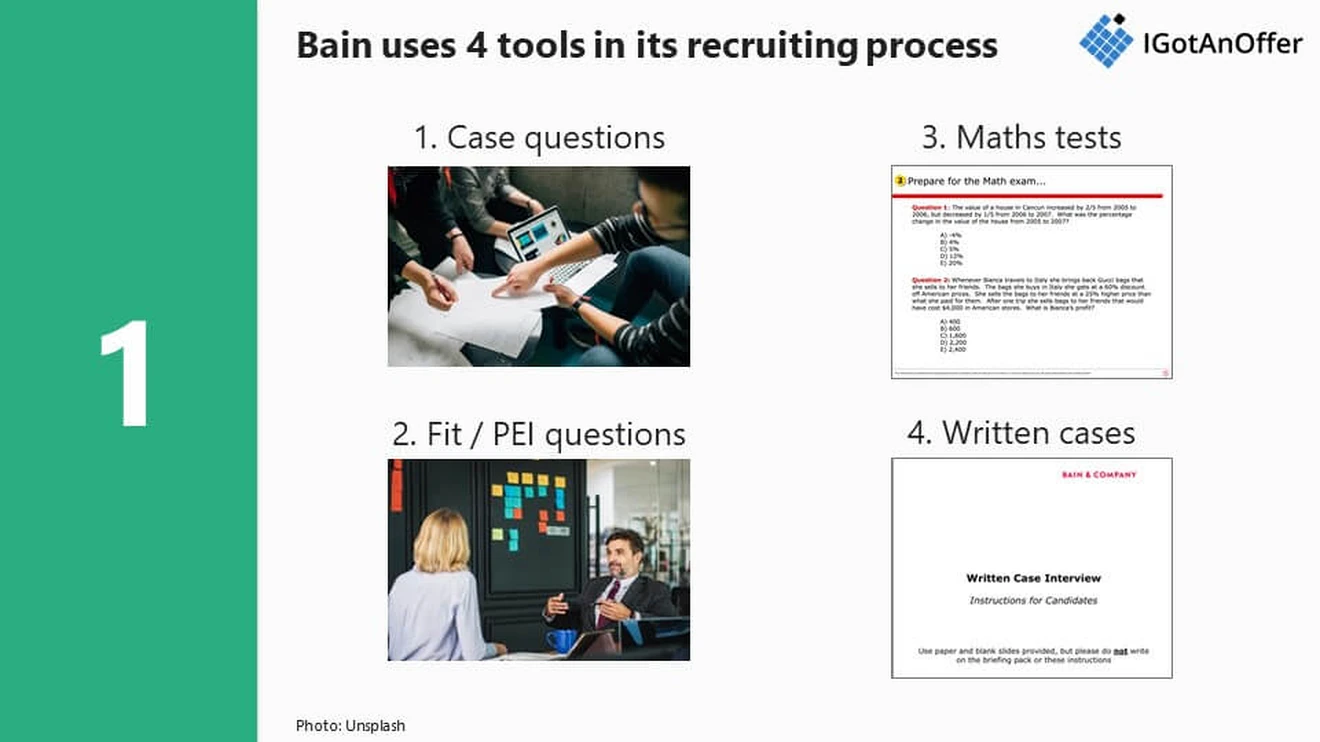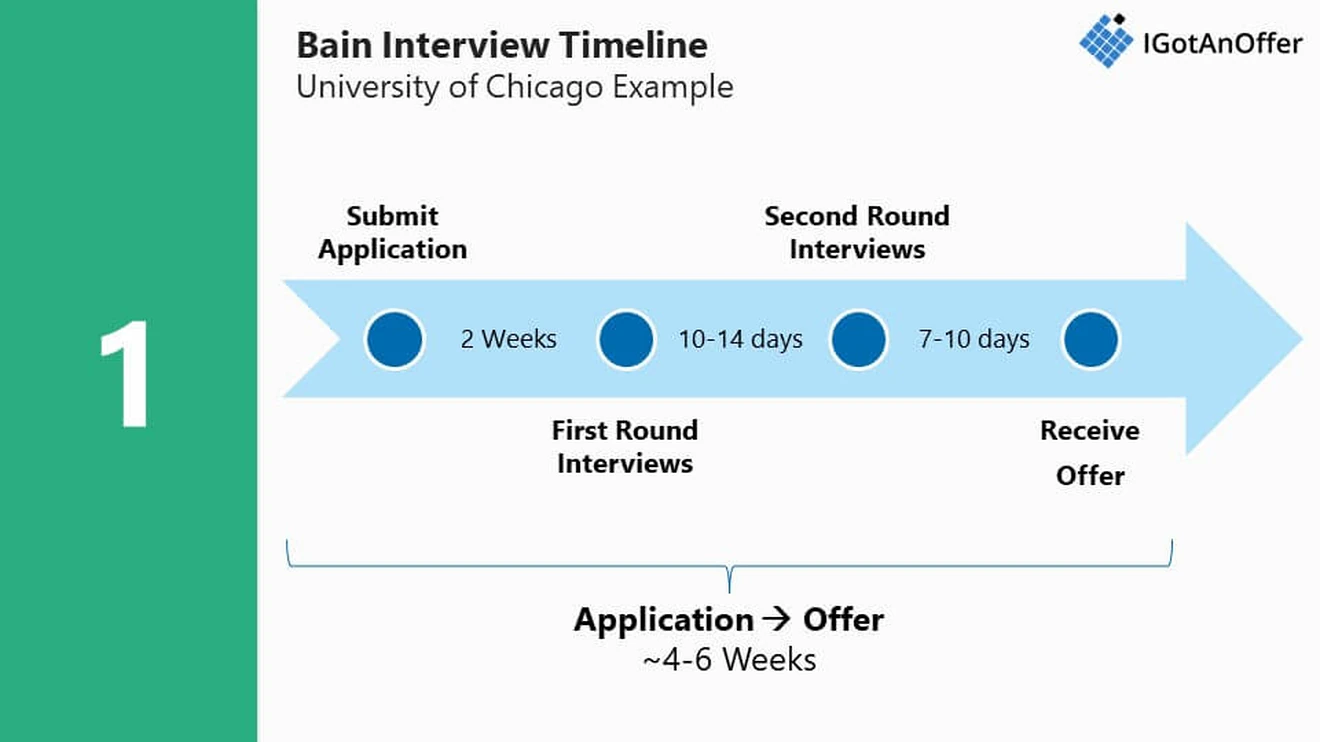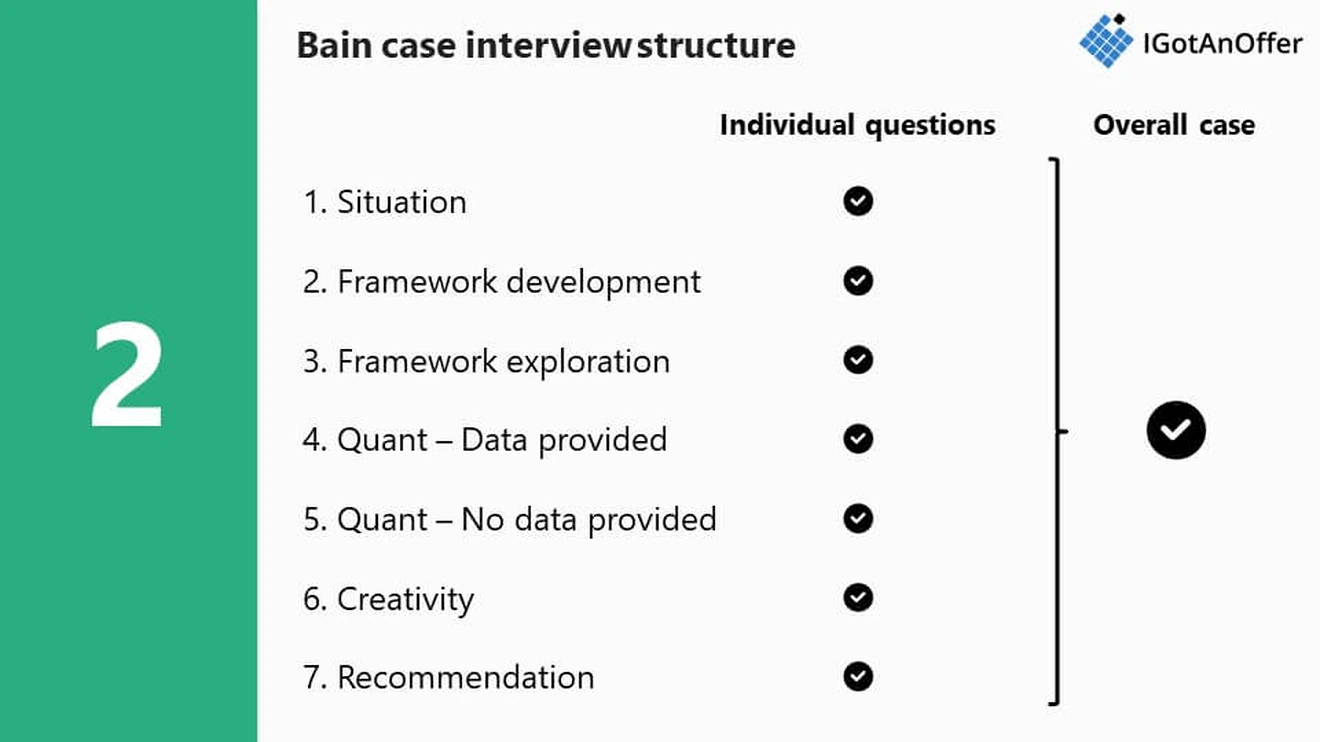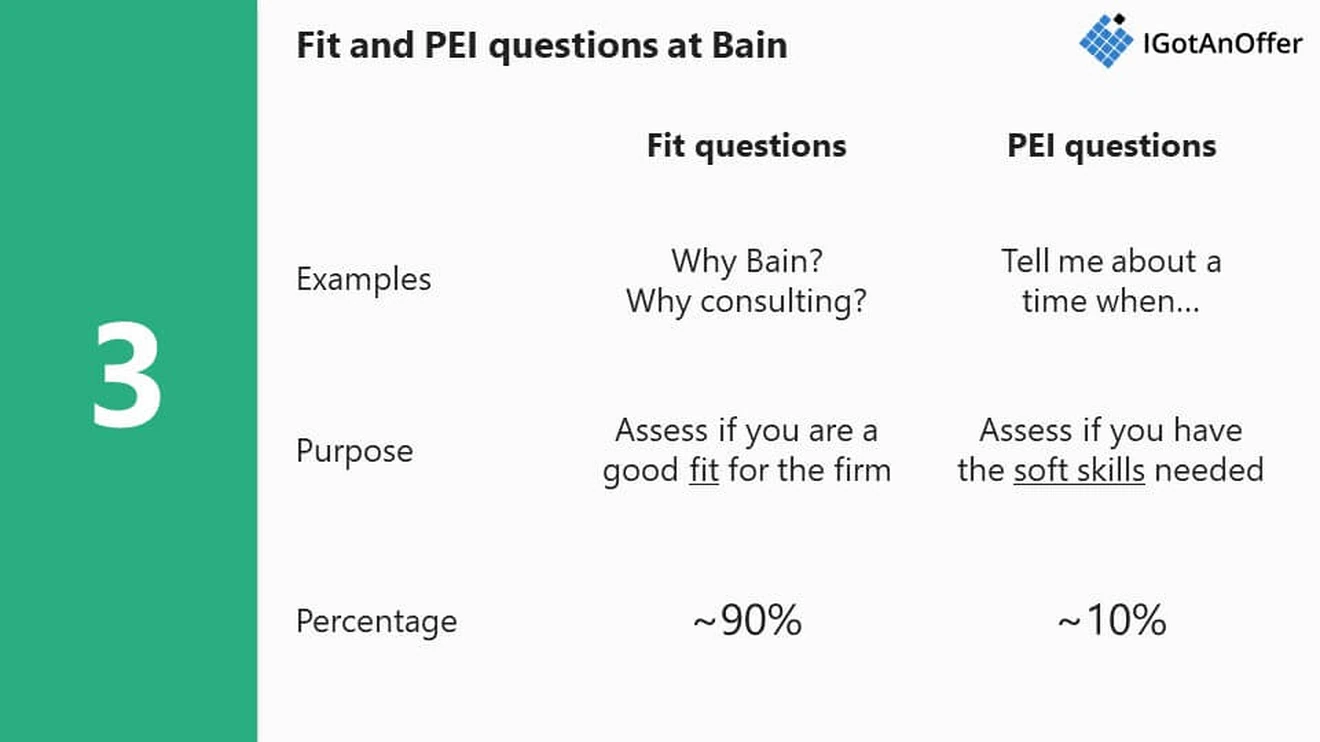Bain case interviews can seem intimidating. But over the years we have managed to develop a simple step-by-step system to get you from "What are case interviews like at Bain?" to "I am confident I can get a job at Bain".
We have helped more than 30,000 candidates prepare for their consulting interviews, and in this guide, we have summarised the most important things you need to know to prepare for your Bain case interviews.
Here's a brief overview of what we'll cover:
Click here to practise 1-on-1 with Bain ex-interviewers
Part 1: Bain interview process and skills tested
Let's first take a look at the interview process you will go through to get an offer from Bain.

1.1 Bain interview process
Bain uses up to four steps in its recruiting process:
- Resume and cover letter screening
- Bain online assessment
- First round interviews
- Second round interviews
First, recruiters will look at your resume and assess if your experience matches the open position. This is the most competitive step in the process—we’ve found that 90% of candidates don’t make it past this stage.
You can use this free resume guide and this free cover letter guide to help tailor your application to the position you’re targeting.
And if you’re looking for expert feedback, you can also get input from our team of ex-MBB recruiters, who will cover what achievements to focus on (or ignore), how to fine-tune your bullet points, and more.
Bain also uses online assessments to screen candidates BEFORE interviews in most regions. There are several formats you can expect, including TestGorilla, SOVA, HireVue, and others. They usually have a mix of quantitative, cognitive, and behavioural tests. Some also include video case interviews.
Once you make it to the interview rounds, Bain will use three tools to assess your application:
First-round interviews at Bain are typically carried out by junior consultants and managers. If you make it to the second round you will then be interviewed by partners of the firm who will make a final decision on your application.
Interviews in both the first and second rounds typically start with one or two fit / PEI questions (~10mins) and your interviewer will then ask you case questions (~35mins). We will cover what to expect from Bain case interviews and fit / PEI questions in more detail below.
In addition, Bain also uses written cases in its SECOND ROUND interviews in some countries including the US, UK and Russia. For written cases, your interviewer will give you a pack of 5 pre-filled slides that you will need to complete in 90 minutes by doing analysis on a 20-page business document. You will then need to present and discuss your 5 slides with an interviewer over a 30-minute time slot.
1.2 Timeline to get an offer at Bain
When preparing for your Bain case interview, it can be difficult to know when to expect each stage of the interview process. To help illustrate a typical timeline, we've created the below overview of Bain's recruitment schedule. As a rule of thumb, you can expect the whole process to take 4 to 6 weeks.
Please note: this is meant to give you a general overview, and may not reflect your specific interview timeline. Actual interview timelines depend on a number of factors (e.g. experienced hire vs. university hire). The below is based on the expected recruitment timelines at the University of Chicago (an MBB target school). You can find the original document from the University of Chicago here.

1.3 Core skills to demonstrate to get an offer at Bain
You might be wondering why Bain uses so many different tools in its recruiting process. The answer is that they are trying to test for a variety of skills that you need as a consultant. According to Bain's website, they are looking for individuals who are:
- problem-solvers
- ambitious about helping clients and stakeholders
- intellectually curious
- entrepreneurial
- excited about challenges
In addition to the above skills that Bain formally lists, it's important to mention additional qualifications that will be critical to your success:
- leadership skills
- communication skills
- soft skills
Now, let's cover each of these skills in a little more detail, to give you an inside look at what Bain recruiters will be looking for during your interviews.
Bain wants to make sure that you've got the problem-solving skills it takes to be a consultant. Bain often gets hired by clients to solve problems they have been unable to solve by themselves. Case questions are therefore designed to test that you have the analytical horsepower to work through complex problems.
Bain wants to hire junior consultants who have the potential to become future partners. And partners' main job is to lead the firm, handle clients and sell projects. Demonstrating that you have leadership ability, and good soft skills, is therefore extremely valuable and will be extensively tested by the firm.
Bain will want to see that you are ambitious and have a results orientation, and that you have a track record of strong academic and/or professional performance. Your interviewers will likely be speaking to many candidates, and in order to stand-out, you're going to need to demonstrate that you are a top performer that can elevate results for your future clients.
Bain wants to know that you are passionate about the type of consulting work you would do at their firm and are excited about conquering challenges. For Bain, this isn't just a marketing slogan, they are very serious about employee engagement and values, which is one reason they are ranked #1 in 2019's Best Places to Work list. During your interviews, they'll want to see that you've thoroughly considered why you want to be a consultant, and specifically, why you want to join Bain.
Finally, Bain will also test your ability to communicate your thoughts clearly. Being an analytical genius has very little value if you can't make your clients understand and believe your solutions to their problems. Bain will therefore want you to communicate your thoughts as simply and as clearly as possible during the whole recruiting process. This will be tested both in case and PEI questions.
Part 2: Bain case questions
Now that you know what to expect in your Bain interviews, let's dive into the different parts you need to prepare for. And let's begin with case questions. The video below will give you a good overview of what Bain case interviews are like:
2.1 Case structure
Bain case interviews are similar to BCG case interviews and can be broken down into 7 types of questions:
- Situation
- Framework development
- Framework exploration
- Quant question – Data provided
- Quant question – No data provided
- Creativity question
- Recommendation

If you would like to deep-dive on this topic, you can learn more about preparing for case interviews in this free case interview guide.
In every case, the first thing your interviewer will do is lay out the company’s problem you are going to solve. Then, they will ask you the areas you would look at to solve the company's problem. This is what is called the framework development question. If you would like to learn more about frameworks you should take a look at this blog post.
In certain types of business problems, you will then have to explore the framework to find the root cause of an issue. This is the framework exploration question. For instance, if the objective of the case is to find out why the company profits are going down, you will have to EXPLORE the framework and test different hypotheses. Profits could be going down because of revenues or costs or a combination of both.
Note that you will not always get a framework exploration question. Your interviewer will sometimes jump straight into quantitative questions. This will for instance be the case if you are asked to analyse which countries Starbucks should go into next. The problem is not about finding the root cause of an issue, and exploring your framework therefore makes less sense.
Then, you will usually have to solve a quantitative question to further understand the business problem at hand. There are essentially two types of quantitative questions in case interviews. Questions where the interviewer provides you with graphs and tables. And questions where no data is provided and you have to make assumptions by yourself.
In addition, your interviewer will usually also ask a creativity question. These are typically open-ended questions such as “What can the company do to justify increasing its product prices?” These questions aim at assessing your capacity to generate qualitative ideas to solve the problem your client is facing.
Finally, at the end of the case your interviewer will ask you a recommendation question. This will test your ability to summarise your thoughts and will require you to provide a suggested course of action, given the client’s situation.
The order and format of these questions may vary slightly between your different interviews. But, you will invariably come across them at some point during your cases, so make sure you're ready for each type of question.
For an overview of the different types of case problems you might face, see our guide: 10 Common Types of Case Interviews.
2.2 Case practice questions
One of the most effective ways to learn the 7 different types of case questions, is to practice with realistic sample cases.
One great way to do this is on YouTube. Watch the mock Bain case below, pausing the video when instructed to in order to write down your own answers.
Case book are also great resources for preparing for your Bain case interviews. Below you'll find a short list of case books from consulting clubs at prestigious universities. You can find a larger list of case interview examples here.
- University of Michigan (Ross) 2010 case book
- University of Virginia (Darden) 2012 case book
- University of Pennsylvania (Wharton) 2010 case book
- London Business School 2006 case book
A good approach for using these sample cases would be to read the question statement, and then respond (out loud) with your own answer before reading the suggested solution. If you can practice with a partner or coach, that's even better. This will allow you to begin developing the skills you will need to succeed in your Bain case interviews. Try to replicate real-life conditions as much as possible, as this will help you be more prepared for the real thing.
There's also a page on Bain's website that has some information about case interviews, provided directly by the firm. The information there is somewhat helpful, but we find it to be rather general. You will likely find it to be more beneficial to prepare with practice cases.
In the next few sections, we'll highlight a few tips that will help you perform on the candidate-led cases Bain uses. If you want even more tips, check out our larger post about case interview tips.
2.3 Tip #1: Make a hypothesis at the right time
One of the questions candidates often ask us when preparing for case interviews is: “Should I use a hypothesis? And if so, when should I use one?” Some coaches such as Victor Cheng from caseinterview.com use a hypothesis all the time. But doing this in practice can feel quite artificial during your case interviews.
For instance, if you are trying to decide what type of new beverage Coca-Cola should launch next year, using a hypothesis is possible but does not add a lot of value. You could start by saying something like: “I’m going to hypothesise that Coca-Cola should launch a new diet orange juice next year because customers are more and more health conscious”.
But, this would be nothing more than a wild guess at the beginning of a case. This is why a lot of candidates are uncomfortable using a hypothesis-driven approach. In real life, the main situation when consultants use a hypothesis is when they are looking for the root cause of an issue.
For instance, when they are trying to understand why the profitability of a company has decreased. The root cause could be many things: lower price, lower volume, higher variable costs, etc. Using a hypothesis in these cases is actually very helpful because it enables consultants to stay really focused and to methodically test all the potential sources until the real issue is identified.
Our recommendation is therefore to do the same in your cases and to only use hypotheses in framework exploration questions where you are looking for the root-cause of an issue.
2.4 Tip #2: Lead the case
Another important feature of candidate-led cases at Bain is that the interviewer will want you to take the lead on the case. This is why Bain cases are often called “candidate-led” cases. After you present your framework to your interviewer they won’t tell you what to do. They will expect you to take the lead and suggest the next step.
This can be surprising at first, if not intimidating. However, there is a very simple way of dealing with this. Every time you answer one of your interviewer’s questions you should simply suggest a next step.
For instance, if you have just presented your framework, you should say something like: “To summarise, I think we should look into revenues and costs to solve this problem. As a next step, my suggestion is to analyse revenues in more detail. I understand revenues have been going down. Would we happen to have any details on how fast that decrease has happened? And how it has impacted the company’s different products?”
By suggesting a next step and asking for more information, you are taking a lead on the case. Interviewers are instructed to be well-intentioned. If you get stuck or are not on the right track, they will nudge you in a different direction.
2.5 Tip #3: Only make data assumptions if you have to
Another important aspect of candidate-led interviews at Bain is that they will require you to make more data assumptions than interviewer-led cases at McKinsey. This is because Bain tends to use more quantitative questions without giving you any data, but McKinsey is less likely to do that.
One question we often get from candidates is: “When should I make a data assumption vs. directly ask the interviewer for the data?” The answer to this is actually very straightforward. You should always ask for the data first. And only if your interviewer tells you the data is not available should you make data assumptions.
A lot of candidates worry about asking for data that is not available, but in reality that’s perfectly fine. It would be nearly impossible for you to guess which data points the interviewer has or doesn’t have. As a result, if you ask for a data point that your interviewer would like you to estimate, they will simply tell you that they don't have the data available.
2.6 Tip #4: Follow the Bain case interview dress code
Another question that candidates often wonder about before their first case interview with Bain, is "what should I wear for my Bain interview?". There are a few things that you should keep in mind when it comes to the dress code. We've summarised some highlights below, and you can also read more in our article on the consulting interview dress code for men and women.
First, follow recruiter instructions. If your HR contact tells you to dress business professional, do it. If they say business casual, dress accordingly. If they haven't specified the dress code, you should feel free to ask your recruiter. They get these questions all the time and will be happy to answer.
Second, don't try to impress interviewers with how you dress. You should dress conservatively for your Bain interview. This may surprise you, but your goal for attire should be to NOT stand-out. Your Bain interviewers are far more interested in your analytical and communication skills than your wardrobe.
At the end of the day, probably the only reason an interviewer would remember your attire is if you dressed badly. So don't take unnecessary risks, and avoid wearing anything flashy or attention-grabbing, like big jewelry and cuff links. Below is the typical attire for Bain case interviews, for both men and women.
Typical dress code for men:
- Suit in a neutral color (e.g. black, grey)
- Button-up shirt in a simple style and color (e.g. white, light blue)
- Tie without flashy patterns
- Black or brown dress shoes that go with your suit
Typical dress code for women:
- Conservative dress or pantsuit in simple colors (nothing shiny or bright)
- If wearing a pantsuit with a blouse, white is standard for the blouse
- No large or loud jewelry, small and simple items are appropriate
- Shoes should be conservative and comfortable
Use your judgment in choosing your interview attire. Asking your HR contact for the dress code is helpful, especially for events or mixers where it's less clear. When in doubt, choose clothes that are professional and conservative. It's better to go unnoticed than for interviewers to be distracted by your wardrobe choices.
Next, we'll turn our attention to the fit and PEI questions that Bain uses.
Part 3: Bain fit and PEI questions
Bain interviewers will also ask you behavioural questions during your interviews. You will come across two main types of questions:
- Fit questions (~90% of questions) such as "Why consulting?" or "Why Bain?" These questions are used to assess if you are a good FIT for Bain.
- Personal Experience Interview (PEI) questions (~10% of questions) such as "Tell me about a time when you lead others" or "Tell me about a time when you managed a team conflict." These questions are asked to assess your SOFT SKILLS.
All firms ask a slightly different mix of PEI and fit questions. We have analysed data from Glassdoor.com for Bain and have summarised the top 5 fit questions asked by the firm and the top 5 PEI questions. Let's go through each list one by one.

3.1 Top 5 fit questions asked by Bain
Let's start with fit questions. Note that the percentages for the top fit questions discussed below add up to 100%. But as mentioned above, fit questions account for ~90% of behavioural questions asked by Bain interviewers, with PEI questions making up the remaining 10%.
So here is the top 5 fit questions:
- Why Bain? (33% of fit questions)
- Why consulting? (25% of fit questions)
- Introduce yourself / Walk me through your resume (20% of fit questions)
- Tell me about X on your resume (5% of fit questions)
- Why choose location X? (4% of fit questions)
- Other (13% of fit questions)
Fit questions at Bain are extremely predictable. The top 3 account for ~80% of all questions. We've extensively discussed how to answer the "Why Bain?" and "Why consulting?" questions in previous posts. Questions 3 and 4 are also frequent questions and you might want to read our article 4 ways to answer “Walk me through your resume”.
But one question that seems to be more frequent at Bain than at other firms is "Why choose location X?" This question is often asked as a follow up to the "Why Bain?" question.
Bain interviewers really want to make sure that you have carefully thought about whether consulting and Bain are a good fit for you. And a big part of your experience as a consultant will depend on the office you are joining.
If you are joining the Houston office, you'll do a lot of oil and gas work. If you are joining the New York office, you'll work in finance and media a lot. Your interviewer wants to make sure that you have done some research and are aware of these differences.
This question is also an indirect way for your interviewer to make the conversation a bit more personal. If you have family in New York or have always wanted to work there because you love the city, now is your opportunity to say it!
Overall, our recommendation for answering the "Why choose location X?" question is to give a mix of work reasons and personal reasons. For instance, you could say something like: "I'm excited to join the New York office for two reasons. First, I'm interested in finance and media and I understand this specific office does a lot of work in these areas. And second, I have family in New York and I've decided it would be a good place for me to start my career."
3.2 Top 5 PEI questions asked by Bain
Let's now briefly turn our attention to PEI questions asked at Bain. These questions only account for about ~10% of behavioural questions asked by the firm. You should only start preparing for these once you are very comfortable with fit questions which are much more frequent (~90% of behavioural questions).
The PEI questions used at Bain are similar to McKinsey Personal Experience Interview questions. They are competency-based questions designed to test the skills Bain looks for such as leadership, impact, and passion. PEI questions are easy to identify because they almost always start with "Tell me about a time when ..." and then some variation of the topics listed below. Here are the top 5 for Bain:
- Leading others (50% of PEI questions)
- Managing a team conflict/situation (20% of PEI questions)
- Managing a personal conflict (10% of PEI questions)
- Overcoming challenges (5% of PEI questions)
- Influencing others (5% of PEI questions)
- Other (10% of PEI questions)
We've written extensively about how to answer PEI questions in the past. Our recommendation is to prepare in advance and to use a pre-defined structure that will ensure you cover all the aspects you interviewer expects. You can read more about this approach here. In addition, you can also find Bain's own tips on the personal experience interview here.
Part 4: Bain case interview preparation plan
So what's the best way to prepare for your Bain interviews?
Let's go through the most important things you need to do to make sure you're fully prepared and to maximise your chances of landing that job offer.
4.1 Become really confident at maths
You don't have to have a perfect GPA or GMAT score to succeed at case interview maths. However, during your Bain interviews, you will be expected to quickly perform accurate mental maths.
In order to do this, it’s essential to know the formulas for common metrics, like return on investment or breakeven point. And it’s also helpful to know a few maths shortcuts to help you solve problems more quickly. To learn more about these topics, check out our free guide to case interview maths.
In our experience, the most successful applicants start their interview preparation by practising maths skills, so make sure you prioritise this step.
4.2 Develop a consistent method to crack cases
One of the biggest challenges of interviewing with Bain is solving cases that you’ve never seen before. Each case can be difficult, and you’ll have to perform well across multiple case interviews in order to get an offer.
As a result, it’s critical for you to have a consistent approach for solving cases. Bain uses candidate-led case interviews, which can be broken down into the following types of questions:
- Situation
- Framework development
- Framework exploration
- Quant question – Data provided
- Quant question – No data provided
- Creativity question
- Recommendation
If you can crack each type of question (within a case), then you can crack the overall case.
4.3. Practise with peers
Once you're in command of the subject matter, you'll want to start practising cases. But by yourself, you can’t simulate thinking on your feet or the pressure of performing in front of a stranger. Plus, there are no unexpected follow-up questions and no feedback.
If you have friends or peers who can do mock interviews with you, that's an option worth trying. It’s free, but be warned, you may come up against the following problems:
- It’s hard to know if the feedback you get is accurate
- They’re unlikely to have insider knowledge of interviews at your target company
- On peer platforms, people often waste your time by not showing up
For those reasons, many candidates skip peer mock interviews and go straight to mock interviews with an expert.
4.4 Practise with experienced case interviewers
In our experience, practising real interviews with experts who can give you company-specific feedback makes a huge difference.
Find a Bain consulting interview coach so you can:
- Test yourself under real interview conditions
- Get accurate feedback from a real expert
- Build your confidence
- Get company-specific insights
- Learn how to tell the right stories, better.
- Save time by focusing your preparation
Landing a job at a top consulting company often results in a $50,000 per year or more increase in total compensation. In our experience, three or four coaching sessions worth ~$500 make a significant difference in your ability to land the job. That’s an ROI of 100x!














